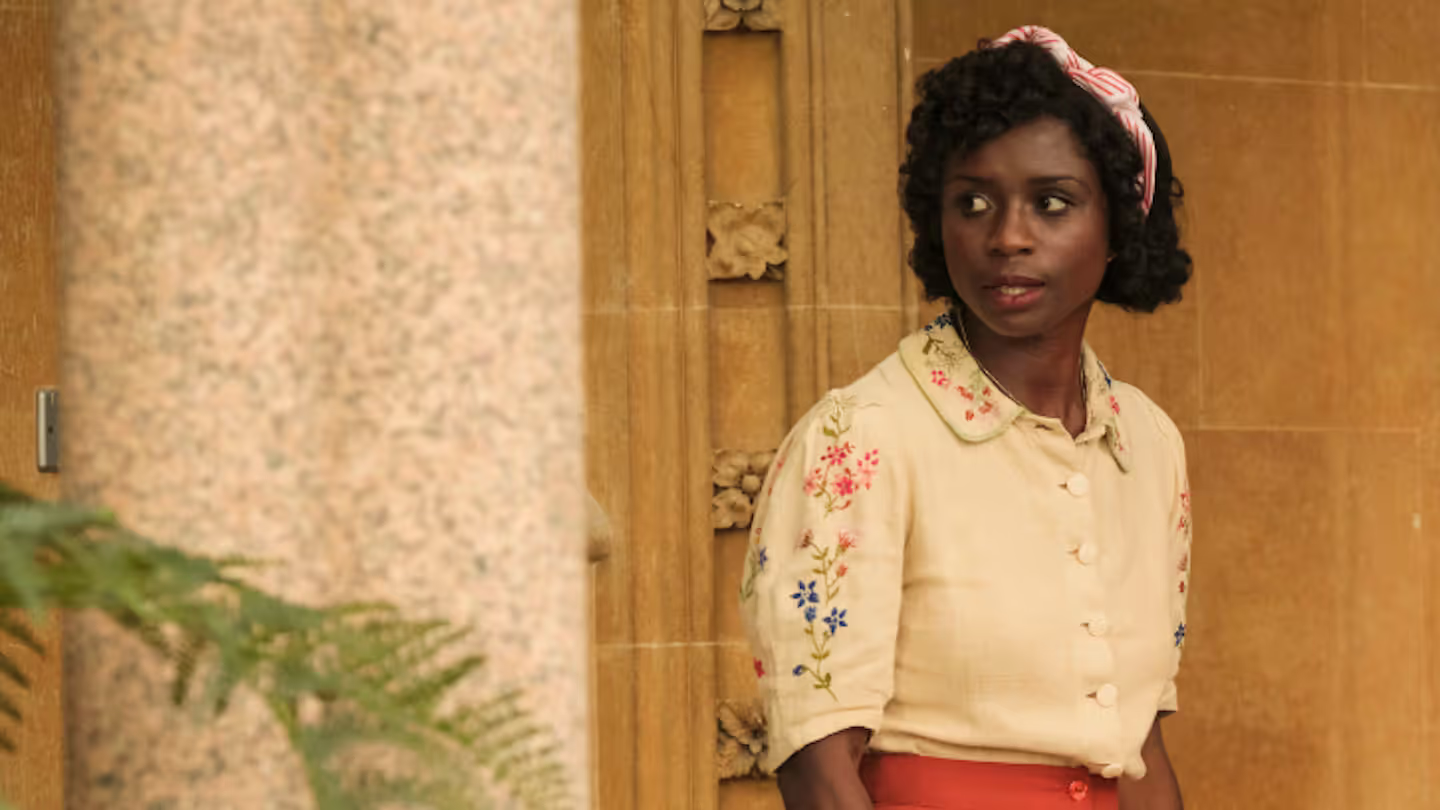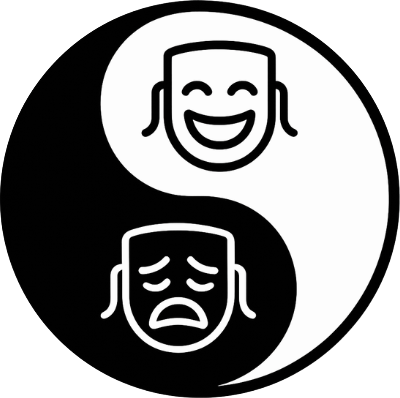Behind the Breakout: Ann Akinjirin
If there's anything Ann Akinjirin can't conquer, we're not aware of it. Although best known as an actor, the British star has also written, directed, and produced both stage and screen productions – and to critical acclaim.
You'll most likely know Ann's work from the Marvel / Disney+ series Moon Knight or Michaela Coel's modern classic I May Destroy You, but keen UK theatre-goers will no doubt also recognise her as the face of Harts, the theatre company she was Artistic Director of from 2010 to 2020.
Now, she's back on our screens in the BBC adaptation of Enid Blyton's The Famous Five series, where she leads a young cast of actors (and a dog) as the beloved Aunt Fanny.
Here, we speak to Ann about rejection, morning routines, and joining the MCU.

You're a true multi-hyphenate. When introduced to someone for the first time, how do you describe yourself – assuming they don't already know of you?
Ann Akinjirin: I describe myself in accordance with what's aligned with what I'm currently doing. At the moment, I'm acting – I'm in a show, and I'm doing press – so if someone meets me, I'll say, "I'm an actress". When I was running my company, depending on the circumstance I was being met in, I'd say, "I'm an artistic director", or, "I'm a writer". It will be aligned with what I'm feeling present in at the moment.
Was there always a master plan to add all these strings to your bow?
AA: No, I think I just have to be highly stimulated in a cerebral sense. I'm also super curious. I pick up things, and I'll be like, "Oh, that seems cool". Like starting to sew. I picked that up as a hobby, and then I got really into it, and then I find a way to make it into something bigger. A lot of the time, it's because I'm just genuinely or generally interested in something.
Quite early in my career, when I started the company and started writing, a lot of those decisions I made because I wanted to have more control of my downtime. I didn't want to do the odd jobbing in between acting jobs. [That] made me feel quite frustrated. So, I picked up other things that I knew I could find a way – it was never easy – to make money from. And so I started doing classes, I started a drama school, I started producing plays, and at the time, the impulse was, "I really want some more control when I'm not acting, and I really want to do something that makes me feel creatively stimulated".
You've been on the actor's path for some time now, which – we assume – means you'll have faced a few nos along the way. How do you think about navigating rejection?
AA: I've always navigated rejection by having something else I do. Putting all of my hopes and desires and aspirations in one lane doesn't work for me mentally, physically, spiritually, or emotionally. It doesn't work. It's so much easier when you're getting yeses elsewhere – and it doesn't necessarily have to be a life goal. It can be, "I spend a lot of time painting". [The rejection] doesn't feel so big when I know I'm feeling satisfied or energised or excited or fulfilled in another area of my life.
I've been around for a really long time. I decided I wanted to be an actor at 11. I've spent more of my life pursuing my goals than not ... But as I'm now older, I've also – as best I can – put equal focus on my personal life as my professional life. Acting is something that I love deeply, and I'm very, very lucky that I get to do it, but it's my job. It isn't 100% of what makes me, me. And so, making sure that there is just as much effort and energy being put into my personal life and finding joy there is also how I manage the nos.
To double-click on that a little, do you have any practices or rituals that help safeguard your broader health and well-being?
AA: I have a morning ritual. I never, ever charge my phone in my room. I don't have a TV in my room. I never use my laptop in my room. For me, there is something about having that clear disconnect from the internet and technology that really helps me. The reason I mention that is, every morning – before I get my phone – I meditate for between 20 to 30 minutes, I write in my journal, and I read a chapter. Those are the three things I do before I connect to the world.
I don't have Instagram on my phone. I have to download it. I have a really specific way of engaging with social media. It's so easy to look at what other people are doing, and having a healthy relationship with that is important. When you're emerging and when you step into self-employment, it's so easy to burn yourself out because you want to say yes to everything. You want to get your credits up. You want to network. You're worrying about money. That's a key way to burn yourself out and to get jaded. You lose sight of how long the game is. It's a really, really, really long game. When you're first starting out, you have to remember that it's a long game.
Staying on shifting perspective, what had to change for you mentally when you joined the Marvel Cinematic Universe?
AA: The MCU is huge. It has such a huge fan base and legacy. I was lucky because I was in a show that didn't have an on-screen history, so we didn't have the pressure of fans saying, "It shouldn't be like that!" But there was the weight and responsibility of just what the MCU is.
Also, I'd never been on such a huge-scale production before. Things move so much quicker, and the money is eye-watering, so there was some intimidation, in truth. And I was working with massive stars. That show had a really small cast, so it would literally be just me and Oscar [Isaac] or me and Ethan [Hawke]. My first day on set was me, Oscar, May [Calamawy], and David Ganley. That was my first day. And it was quick. There wasn't time to go, "Let's do a little pep talk!" No, I was on set and I had to do what I had to do and deliver. Being part of something so huge did require a different level of bringing myself into the room, for sure.
Would you say your definition of "success" has evolved in the wake of this run of blockbuster hits?
AA: I think your definition of success has to change as you evolve as a person and as you get older. With age comes different desires. I also think we should have a healthy relationship with goals and aspiring to things because when you're a deeply motivated, aspirational person, you have a desire to do a thing, and then on the way there, it changes. When I first started, I just wanted a TV credit. So I get a TV credit, and on route to getting a TV credit, I'm like, "Actually, I want to be featured on TV shows". So I get featured, then, actually, I want to be main cast. I was never really reaching the goalpost. I had to start redefining what success looked like because, in some ways, I was never really succeeding. I was always past the point I was hoping or dreaming of.
I've spoken to massive stars – massive stars – and they're like, "I just want to do [x], but I'm only doing [y]". And I'm sitting there thinking, I would kill to be doing what you're doing. That just shows me it never leaves you. You're constantly going to be reaching for something else, and for that reason, your definition of success has to be redefined as you get older – not just in age but also in experience. You have to start being a bit wider in terms of what you define as success.
For me, success is things like my heart is right, my mind is right, I feel happy, I feel loved, I work really hard on my boundaries. Yes, there are financial things and career things, but it's a part of a bigger puzzle.
Gold dust ✨ Any parting words for the Dojo community before we wrap?
AA: Never give yourself a reason why not to do something. This is what I'd say to myself a lot in the beginning. If you don't know people, get to know [them]. If you haven't been in that building, go to the building. We're all the same. "I don't know what I'm doing" – nobody knows what they're doing. "I don't have any money" – no one has any money. None of those reasons are actually valid. It's so easy for us to give ourselves reasons why not. Give yourself the reason why.
The further you get in this business, the more you realise we're all just blagging it. We're all just figuring it out as we go.
Big love to Ann for her time. Be sure to follow Ann's journey over on Instagram, and if you wave hello, let her know you're from the Dojo 👋
Thoughts / feedback / challenges for us? We'd genuinely love to hear.
